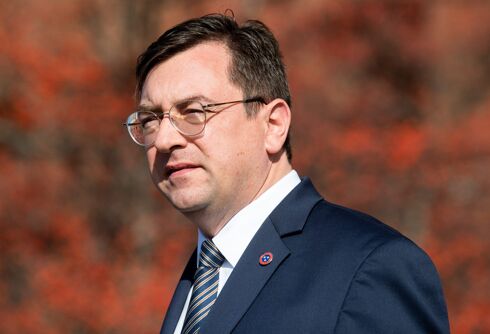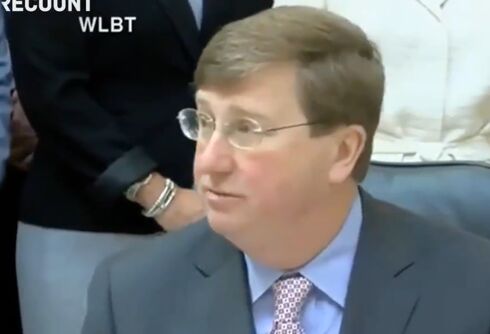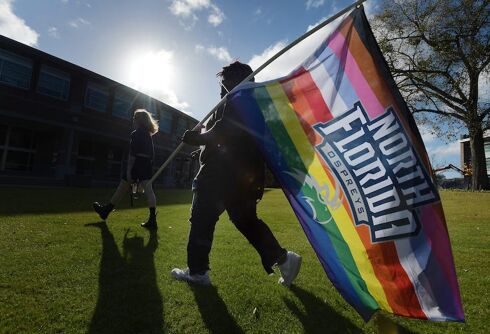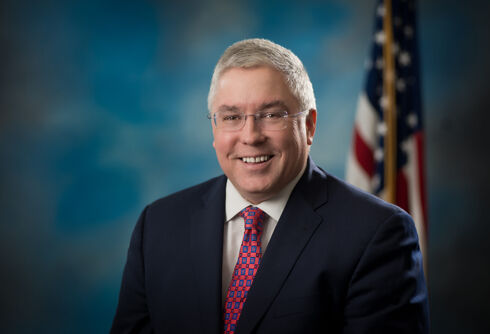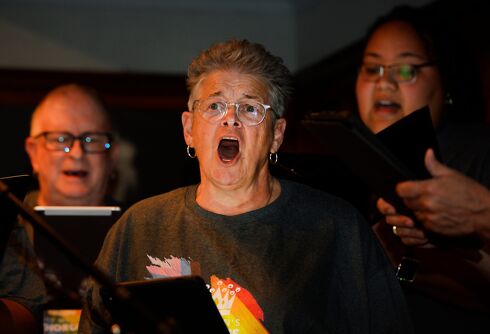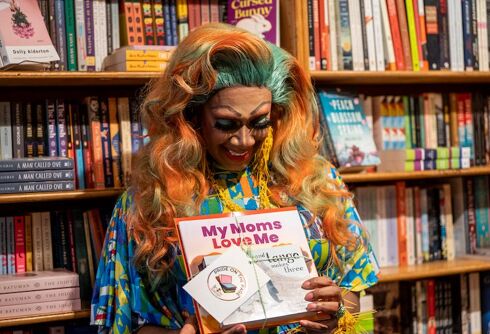
Rick Bowmer, AP
Updated: 8:30 p.m. MDT
DENVER — A federal appeals court ruled for the first time Wednesday that gay couples have a constitutional right to marry, extending the movement’s legal winning streak and bringing the issue a big step closer to the U.S. Supreme Court.
The three-judge panel in Denver ruled 2-1 that states cannot deprive people of the fundamental right to marry simply because they choose a partner of the same sex.
The court dismissed as “wholly illogical” the notion that allowing gays to wed could somehow undermine traditional marriage.
The decision by the 10th U.S. Circuit Court of Appeals panel upheld a lower-court ruling that struck down Utah’s gay marriage ban. It becomes law in the six states covered by the 10th Circuit: Colorado, Kansas, New Mexico, Oklahoma, Utah and Wyoming. But the panel immediately put the ruling on hold pending an appeal.
The Utah attorney general’s office planned to appeal, but it was assessing whether to go directly to the U.S. Supreme Court or ask the entire 10th Circuit to review the ruling, spokeswoman Missy Larsen said.
Wednesday’s decision “takes us one step closer to reaching certainty and finality,” the office said in a statement.
After the ruling, the couples named in the appeal hugged, cried and exchanged kisses at a news conference outside their attorney’s offices in downtown Salt Lake City.
Article continues below
Plaintiff Derek Kitchen said he and his partner, Moudi Sbeity, are “so proud to be a part of history.”
Later, about 300 people rallied in support of the ruling at a Salt Lake City park where rainbow flags and colorful signs were displayed proudly.
“It’s an incredible day,” said Chris Johnson, who married his partner, David Tuma, in December while gay marriage was briefly legal in Utah. “We met 19 years ago. We are former Air Force officers. It’s wonderful after 19 years to have this relationship.”

Rick Bowmer, AP
The decision gives increased momentum to a legal cause that already has compiled an impressive record in the lower courts after the Supreme Court last year struck down the federal Defense of Marriage Act. Since then, 16 federal and state judges have issued rulings siding with gay marriage advocates.
The latest of those rulings was in Indiana, where a federal judge threw out that state’s same-sex marriage ban Wednesday in a decision that immediately allows gay couples to wed. The Indiana and Utah rulings came just one day ahead of the anniversary of the landmark Supreme Court decision striking down part of the federal anti-gay marriage law.
The Utah ruling was especially significant because it was the first appellate court to conclude that last year’s Supreme Court decision means states cannot deny gays the ability to marry.
In 2012, an appellate court struck down California’s gay marriage ban but said it was only ruling on that law, not the broader constitutional questions. There were no such caveats in Wednesday’s 65-page decision.
Evan Wolfson, president of Freedom to Marry, said Utah’s legal victory was sweeter because of where it originated — a conservative, deeply religious state in the heart of the mountain West.
“What is so powerful here is that we have the first federal appellate court and … it’s a case coming out of Utah affirming in the strongest, clearest, boldest terms that the Constitution guarantees the freedom to marry and equal protection for all Americans and all means all, including gay couples,” he said.
Within hours of the Utah decision, the Boulder County, Colorado, clerk announced that she would issue marriage licenses to gay couples because Colorado’s gay marriage ban would be voided if the decision stands.
The Church of Jesus Christ of Latter-day Saints, based in Salt Lake City, said on its website that it maintains marriage should be between a man and a woman, but believes “all people should be treated with respect.”
In his dissent, Justice Paul J. Kelly Jr. said the 10th Circuit overstepped its authority and that states should be able to decide who can marry.
“We should resist the temptation to become philosopher-kings, imposing our views under the guise of the 14th Amendment,” Kelly wrote.
More than 1,000 same-sex couples in Utah wed in December after the initial ruling in the case, before the Supreme Court issued a stay. Along with the Utah case, the 10th Circuit panel considered a challenge to Oklahoma’s ban. It did not immediately rule in that case Wednesday.
“While judges can, by judicial fiat, declare same-sex ‘marriage’ legal, they will never be able to make it right,” said Tony Perkins, president of the Family Research Council. “The courts, for all their power, can’t overturn natural law.”
Though the Utah and Oklahoma cases have been closely watched, it’s unclear if one of them will be the first to reach the Supreme Court. The high court could choose from cases moving through five other federal appellate courts and wouldn’t consider a case until next year at the earliest.
This material may not be published, broadcast, rewritten, or redistributed.






